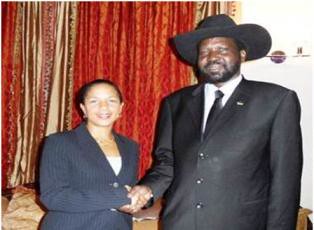
South Sudan President Salva Kiir with Susan Rice, the United States Ambassador to the United Nations. The state of Sudan was partitioned after the South held a referendum on its future in January 2011., a photo by Pan-African News Wire File Photos on Flickr.
South Sudan parliament’s first sitting fails over internal power wrangling
August 4, 2011 (KHARTOUM) – The transformed national legislative assembly of the newly born Republic of South Sudan (RSS) has failed to conduct its first sitting as senior lawmakers wrangle over who to lead the new national house after the integration of MPs coming from Khartoum.
On Monday President Salva Kiir Mayardit issued a number of presidential decrees transforming the regional South Sudan Legislative Assembly into a national one after independence. He confirmed and merged the membership of the lawmakers elected to both Juba and Khartoum during the interim period by 170 and 96, respectively, and added 66 more new appointees, bringing the total number to 332.
The new house was scheduled to have its first sitting on Wednesday, August 3, in which all the members would take oath of office in the presence of the speaker of the house. However, disagreements over who should lead the new house as speaker or deputy to the current speaker have emerged for the last three days.
The SPLM’s deputy chairman, James Wani Igga, has been serving as the speaker of the house in Juba for the last six years. He was recently deputized by Daniel Awet Akot, who is member of the political bureau, the highest organ of the government and former governor of the Lakes state.
Another senior official in the SPLM, Atem Garang, had served for equally six years as deputy speaker in the national legislative assembly in Khartoum.
With the coming back to Juba parliament of the members from Khartoum, the incoming members want to reconcile their ranks with the ranks of members in the previous regional parliament in Juba, hence demanding that the position of either the speaker or the deputy speaker should be allotted to those coming from Khartoum, a demand resisted by Juba based legislators.
A member of the South Sudanese parliament told the Sudan Tribune by telephone from Juba that the two blocks have reached a deadlock in the debate over the issue which he said was referred to President Salva Kiir Mayardit, on Thursday for further intervention.
He added that the difference was also complicated by the accommodation of senior party members as well as consideration of regional balance in the executive and legislative organs of the government.
The MP further said both Igga and Akot wanted to maintain their respective positions as speaker and deputy speaker, respectively, citing article 92 (1&2) of the transitional constitution which did not specify the process of merging the two memberships.
He suggested that there is a need to find out a mechanism to organizer the merger of the members of the National Assembly of the Republic of Sudan in the South Sudan’s National Legislative Assembly in a way to take in account their ranks and experience.
VICE-PRESIDENT NOT CONSULTED
The Vice President of the Republic of South Sudan, Riek Machar, was not consulted by President Salva Kiir Mayardit in the process leading to the final selection of nominees and appointment of the new members to the national legislative assembly as well as to the council of states, revealed a reliable source.
A member of parliament who preferred anonymity told the Sudan Tribune that the Vice President was not aware of the final selection process and was surprised like any body else when the new appointments of 96 members were officially announced on the official South Sudan television.
He further said that the President sidelined his deputy and informally consulted with a number of his close "loyalists" among the current caretaker ministers and advisors, particularly among those that drafted the transitional constitution. He also regretted that the appointed membership is dominated by the Dinka ethnic group.
Attempts by the Sudan Tribune to confirm this development from the office of the Vice President did not succeed.
Machar was constitutionally appointed by Kiir on 10 July for the third time as his deputy following the attainment of independence on 9 July.
The vice-president last June showed his opposition to many provisions of the transitional constitution but Kiir ignored it and even slammed publicly Machar’s position against the presidential attributions
No comments:
Post a Comment